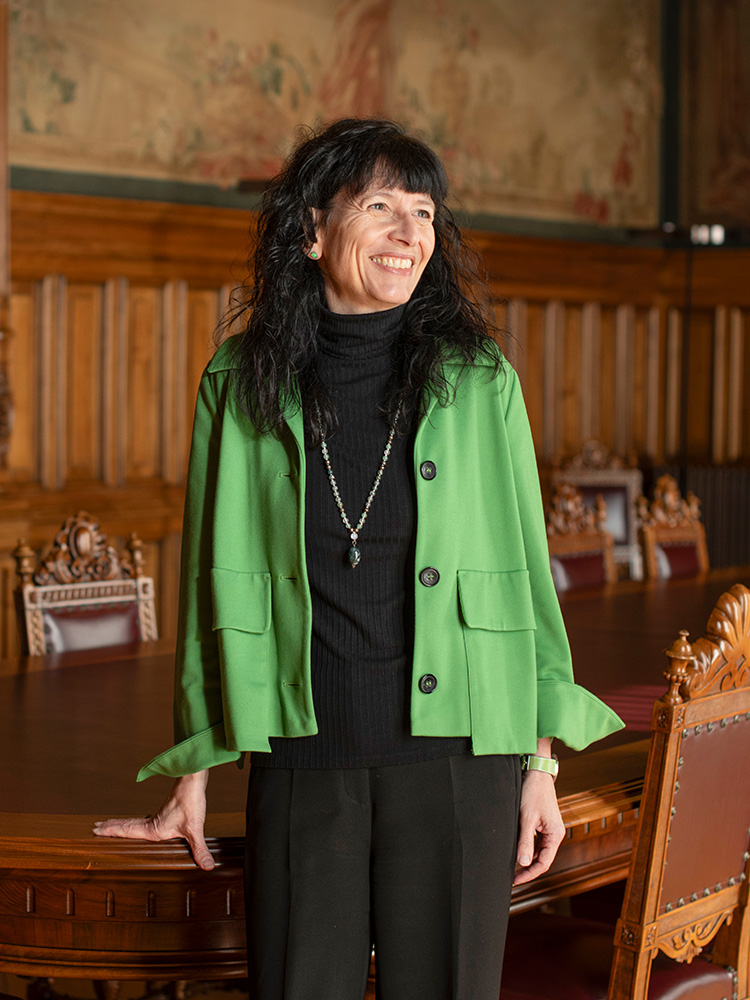The nuances of legal language.
Interview: Marion Maurer
Karin Scherrer Reber studied law at the University of Basel. She was appointed as a federal judge in 2022 – a career development that was not necessarily planned.
AlumniBasel: Karin Scherrer, was it always your professional goal to become a federal judge?
Karin Scherrer: No, not at all. The journey I took to get to this point wasn’t planned this way. To an extent, it’s simply how things turned out. Originally, I wanted to be a journalist or a writer; something involving language and creativity — that was important to me.
And then you chose law?
(Laughs.) The one doesn’t exclude the other. Language is the most important tool we use in jurisprudence. You can’t be as creative as a journalist can be, of course. The law is our foundation, and we apply it. But the nuances of language are often key, particularly in Supreme Court judgements. Studying law is much more than just learning paragraphs off by heart. At university, I found the subject matter very interesting, although admittedly a little dry at times.
So studying law wasn’t the right choice after all?
No, it was! I can say with complete confidence that I would choose to study the same subject again. Law keeps pace with the times. Legislation reflects what’s happening in a society, what’s affecting it. We need rules for our society to function. I find this interplay intriguing. And studying law offers so many options; you don’t have to become a lawyer or a judge, you could also move into management, business or politics.
What path did your career take?
After graduating, I did an internship with the judicial office and the notary’s office in Dornach. On my first day, I knew I’d made the right choice! After that, I worked at various places, including the legal service of the Solothurn construction and justice department and as a legal clerk at the Federal Supreme Court in Lausanne. Both roles were fascinating, and I learned about many different aspects of legal work. Particularly in cantonal administration, you often work outside of the office, in direct contact with the people, and might find that you’re able to resolve a conflict before it ends up in court. These experiences were really significant for me.
In 2012, you became an ordinary judge with the court of appeal of the Canton of Solothurn — and kept your pregnancy a secret during the nomination process.
The day I heard about the vacancy, I also found out that I was pregnant with my second child. I didn’t mention this during the hearing before the cantonal parliament — for which I was reproached by certain people. Throughout my entire pregnancy, I felt as though I had to apologize for my growing belly. I think it’s important to emphasize that it shouldn’t be this way. Of course, I understand that it isn’t pleasant for an employer to appoint someone who, just a few months later, is unavailable for a number of months. But you can’t plan a pregnancy; it’s a miracle, and something you’re allowed to be excited about. Besides, men don’t get asked about family planning. Even now, it’s largely the woman who bears the — sometimes enormous — dual pressure of children and work. And then there’s the societal pressure and the feeling of having to prove yourself all the more. Nevertheless, I’d like to encourage young women in particular to take a chance and not choose between their family and career right from the outset.
You’re experiencing this double pressure yourself. Did that influence your decision to stand for election as a federal judge?
With two school-age children, it didn’t even seem like an option at first. But I knew I’d be annoyed if I didn’t at least try. Now I’m in my third year as a federal judge and am delighted to be doing work again with a more academic slant: At Federal Supreme Court level, the facts of a case are already established by the lower court, leaving more time to engage with academic works on the interpretation of the law. As the highest authority, we’re responsible for jurisdiction; not least because discussing Federal Supreme Court rulings is a key component of law studies and shapes the next generation of lawmakers.
More articles in this issue of UNI NOVA (May 2025).

